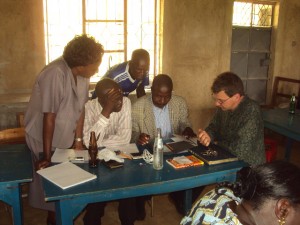
On Valentine’s Day we launched the pilot program with 3 pairs of schools. Each pair consists of a primary school (8 years of schooling from 5 years old) and a secondary school (which covers 4 years of schooling). The Kenyan schooling is known as 8+4+4 with the final 4 years intended for university or college.
We held a workshop with teachers from the 6 schools, and with various school governors, the local chief, a representative from the district education, and various senior pastors, together with several people from the UK and several local staff of the charities we support.


I (Julian) ended up taking charge of the teachers during their tutorial / experimentation which was fun and surprisingly effective.The teachers has 2 sessions where they experimented with the devices to learn how they could be used. At the end of each session various teachers shared some of their discoveries with the teachers from the other schools. This helped them to realise they have more to gain from being open and collaborating, than if they kept their discoveries private.
The teachers each signed for the devices as part of establishing the formal pilot project and so they realise they’re now responsible for them. The don’t have to repay anything if the equipment is lost or damaged though. That wouldn’t be useful or productive… They each have a copy of a guide on how to maintain their device and keep it safe. They seemed very excited to use the eReaders.
In Kenya there are 2 people helping with the ongoing support: Leonard who liaises with the teachers and is helping encourage and support them to use the devices productively, and Jeremiah who deals with the technical aspects e.g. establishing Wi-Fi connectivity and helping with charging the devices where the school has no suitable power. We left Jeremiah with the spare Kindle.
Here is a link to an article written by Leonard after the workshop. http://www.upendopartnership.org/node/129